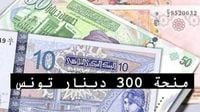In response to the challenging economic circumstances faced by many Tunisian families, the Tunisian government is stepping up its efforts to provide necessary support. One of the significant initiatives is the introduction of a 300 dinar grant offered by the Ministry of Social Affairs, aimed at assisting citizens grappling with economic difficulties.
The grant is designed to help families manage the rising costs of living, particularly in light of soaring prices that have heavily burdened low-income households. This financial assistance is considered one of the most important forms of social support under the government’s policies to aid the most vulnerable segments of society.
To facilitate access to this grant, the Ministry has established a clear mechanism for registration. Eligible citizens can apply electronically through a dedicated online platform, which not only saves time but also simplifies the process of obtaining financial support without the need to visit government offices.
For those interested in applying for the 300 dinar grant in Tunisia for the year 2025, there are specific eligibility criteria that applicants must meet. Firstly, applicants must be Tunisian nationals and must reside permanently in Tunisia. Additionally, they must be unemployed in both the public and private sectors, which means they cannot have a steady monthly salary.
Moreover, individuals who are already receiving other fixed social grants that exceed a certain threshold are not allowed to apply for this grant. It is also essential for applicants to ensure that their data is up-to-date on the designated digital platform for social aid applications. Supporting documents, such as a certificate of unemployment or medical records, may also be required to validate their social or financial status.
The process for registering for the 300 dinar grant is straightforward. Applicants need to follow a series of simple steps to successfully submit their applications. First, they must access the official website of the Ministry of Social Affairs using either a computer or mobile device. If they are already registered, they can log in using their previous credentials.
After logging in, applicants will need to fill out an electronic form that requests personal information, including their full name, national ID number, address, social status, number of family members, professional status, and income-related details. Once the applicant verifies the accuracy of the information entered, they can submit their application by clicking the 'Send' button.
Upon submission, applicants will receive a reference number, which allows them to track the status of their application and learn the final outcome.
Meanwhile, in Libya, there is also a significant initiative underway involving the Central Bank of Libya, which has introduced a system for reserving up to 4000 US dollars annually for personal purposes. This initiative is particularly relevant for citizens who depend on foreign currency to cover various expenses, such as education abroad, medical treatment, or travel for personal or professional reasons.
The process of reserving the 4000 dollars is designed to be straightforward and efficient, provided that applicants adhere to the required steps and conditions. To begin, citizens must visit the official website of the Central Bank of Libya, which features a user-friendly digital interface that facilitates access to numerous services.
Once on the website, individuals should search for the 'Personal Purposes System', which specifically caters to the reservation of foreign currency. After locating this option, applicants must register their entry into the system using the necessary data.
Next, they will select the option for 'Reserving Foreign Currency for Foreign Employment' and specify the amount they wish to reserve, ensuring it does not exceed the annual limit of 4000 US dollars per citizen.
Applicants are also required to input their personal and banking information to successfully submit their requests. To confirm the acceptance of their application, they must upload several necessary documents, including a valid national ID card, a bank statement proving an active banking relationship, and any documents that clarify the reason for requesting the funds, such as proof of university enrollment, a medical report, or a travel ticket.
Utilizing the official website of the bank not only streamlines the application process but also helps to avoid interactions with unofficial entities, ensuring the safety and integrity of the transaction.
As both Tunisia and Libya navigate their respective economic challenges, these initiatives represent crucial steps towards providing financial relief to citizens in need. The efforts of the Tunisian government to distribute grants and the Central Bank of Libya’s foreign currency reservation system reflect a growing recognition of the importance of social support in times of economic hardship.
The 300 dinar grant in Tunisia and the 4000 dollar reservation system in Libya are examples of how governments are responding to the pressing needs of their populations, aiming to alleviate some of the burdens faced by families struggling with high living costs and economic uncertainty. As these programs unfold, they will undoubtedly play a vital role in supporting the affected communities and fostering a sense of stability amid ongoing economic challenges.




